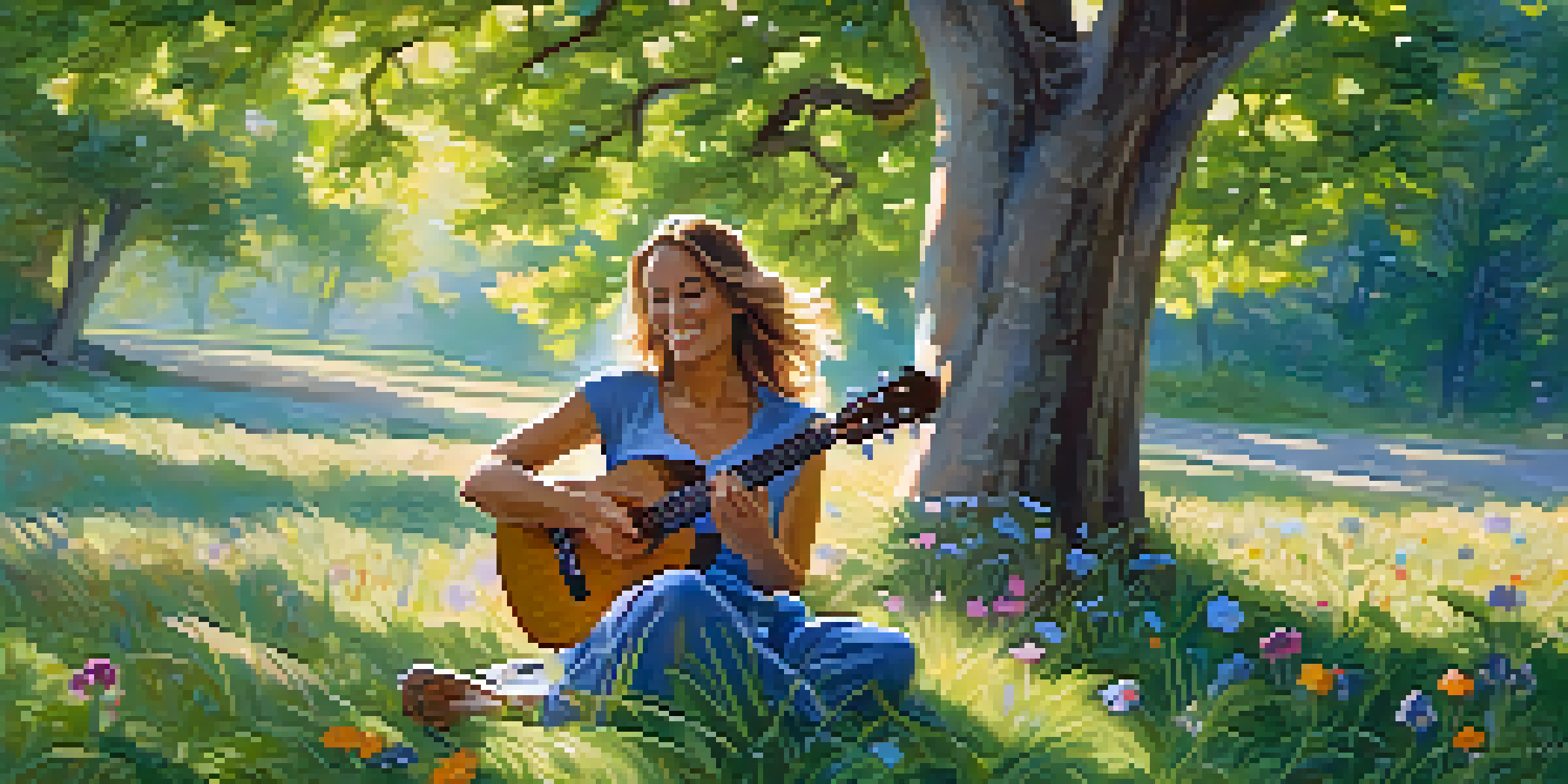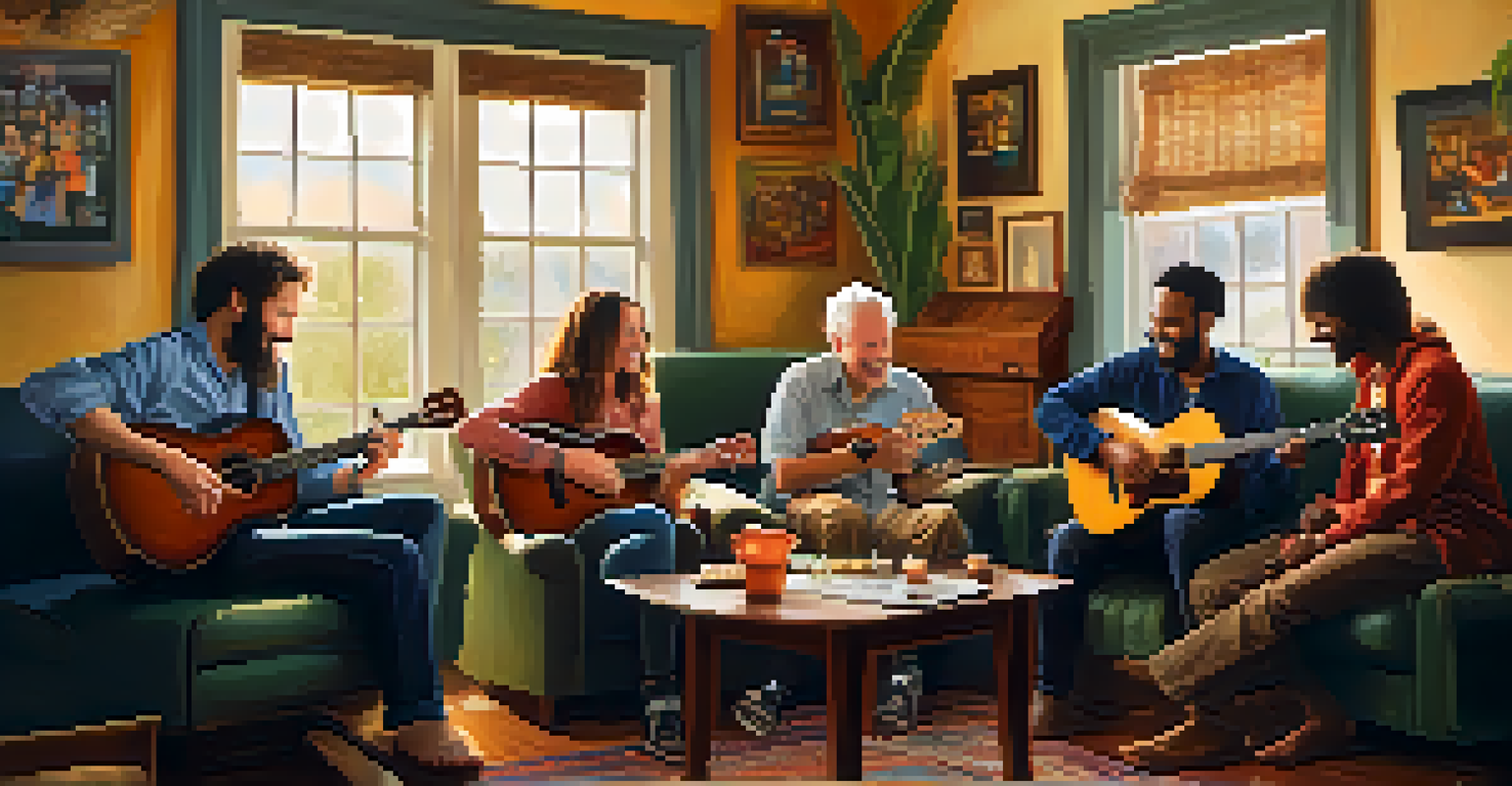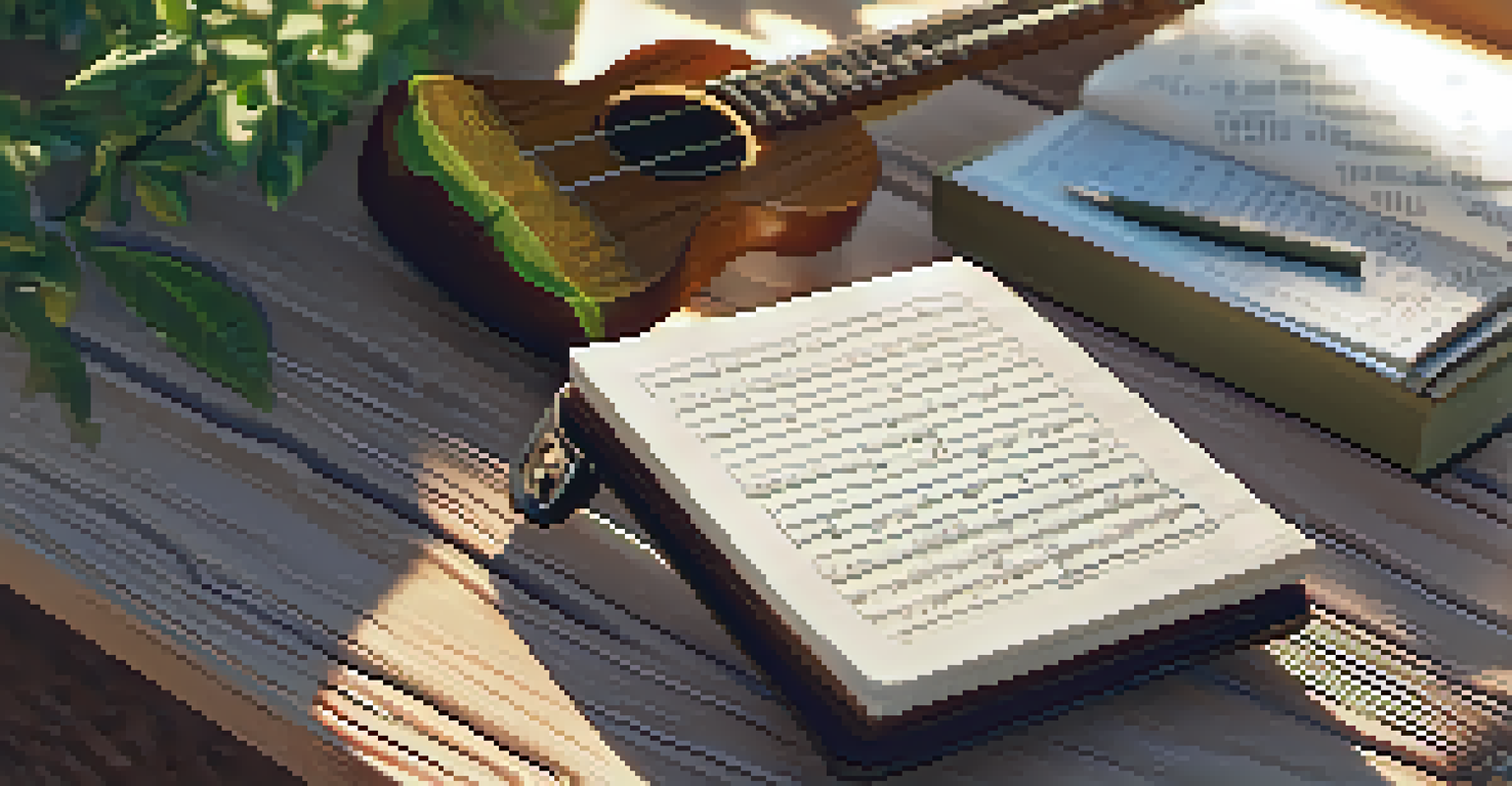Exploring Musical Storytelling with the Ukulele: A Guide

The Magic of Musical Storytelling with the Ukulele
Musical storytelling is an age-old tradition that resonates with many cultures. It allows musicians to share experiences, emotions, and narratives through melody and lyrics. The ukulele, with its cheerful sound and approachable nature, is an ideal instrument for weaving these tales.
Music can change the world because it can change people.
Think of the ukulele as a friendly companion on your storytelling journey. Its light, airy tones can evoke a sense of joy, nostalgia, or even longing, depending on how you play it. Just like a good book, a well-crafted song can transport listeners to different worlds.
By combining simple chords and heartfelt lyrics, you can create songs that not only entertain but also resonate deeply with your audience. Whether you're performing at a small gathering or sharing your music online, the ukulele can help you craft stories that stick in people's minds.
Choosing Your Themes: What Stories to Tell
When it comes to storytelling through music, choosing the right theme is crucial. Reflect on your own experiences, passions, or even fictional tales that resonate with you. Each theme can shape the mood of your song and guide the narrative you want to convey.

Consider universal themes like love, loss, adventure, or friendship; these topics often evoke strong emotions and can connect with a wide audience. For example, a song about a summer romance can bring back fond memories for many listeners, making your story relatable and engaging.
Choosing Relatable Themes
Selecting universal or personal themes enhances the connection with your audience.
Don't shy away from personal stories, either! Sharing your unique experiences can create a special bond with your audience, making them feel like they're part of your journey. Remember, authenticity is key in storytelling, and the ukulele can be your perfect storytelling partner.
Crafting Lyrics: The Heart of Your Story
Lyrics are the backbone of any musical story. They provide the narrative and emotional weight that can draw listeners in. Start by jotting down your ideas or feelings related to your chosen theme; this will help you create a framework for your song.
The beautiful thing about music is that it connects people. It brings people together despite their differences.
Think of lyrics as a conversation with your audience. Use vivid imagery and relatable phrases to paint a picture in their minds. For instance, instead of saying 'I was happy,' you might say, 'The sun danced on my skin as laughter filled the air.' This adds depth and invites listeners to feel your emotions.
Don't forget about the structure of your lyrics. Incorporating verses, a chorus, and perhaps a bridge can help create a natural flow to your story. This structure not only makes your song easier to follow but also enhances its overall impact.
Melody and Chords: Setting the Mood
Once you have your lyrics, it's time to focus on melody and chords. The ukulele's simple chord structure makes it an accessible instrument for creating catchy tunes. Experiment with different chord progressions to find the sound that best complements your lyrics.
For instance, a major chord progression can evoke feelings of happiness and optimism, while a minor progression might instill a sense of melancholy. By matching your chord choices with the emotions in your lyrics, you can enhance the storytelling experience for your listeners.
Engaging Performances Matter
Connecting with your audience through eye contact and emotion elevates the storytelling experience.
Don't hesitate to play around with strumming patterns and rhythms, as these can significantly impact the feel of your song. Whether you choose a lively, upbeat tempo or a slow, reflective pace, your musical choices should amplify the narrative you're sharing.
Performance Tips: Connecting with Your Audience
Performing your music is where the magic truly happens. It's your opportunity to connect with your audience and share your story in a personal way. Before stepping on stage, take a moment to prepare yourself mentally; this will help you convey the emotions behind your song.
Engage with your audience by making eye contact and inviting them into your story. A warm smile or a heartfelt introduction can set the tone for your performance. Remember, your listeners are not just there to hear music; they want to feel the emotions and narratives you’re sharing.
Practice is key to feeling confident in your performance. The more you play, the more comfortable you'll become with expressing yourself through the ukulele. So, grab your instrument, and let your stories unfold in front of your audience!
Recording Your Musical Stories: Sharing with the World
In our digital age, recording your music has never been easier. Whether it's a simple smartphone recording or a more polished studio session, capturing your songs allows you to share your stories with a broader audience. Start by choosing a quiet space where you can focus on your performance.
Consider adding elements like harmonies or additional instruments to enhance your recordings. While the ukulele shines on its own, layering sounds can create a richer experience for your listeners. This can also help convey the emotions of your story more effectively.
Musical Storytelling with Ukulele
The ukulele's cheerful sound is perfect for sharing emotions and narratives through music.
Once you've recorded your music, think about how you want to share it. Platforms like social media, music streaming services, and personal websites can help you reach listeners worldwide. Embrace the opportunity to share your unique stories, and watch your audience grow!
The Joy of Collaboration: Building a Musical Community
One of the most rewarding aspects of musical storytelling is the opportunity to collaborate with others. Joining forces with fellow musicians can lead to new ideas, fresh perspectives, and a sense of community. Collaborations can range from songwriting partnerships to live performances, each offering a unique experience.
Consider joining local ukulele groups or online forums where you can meet like-minded individuals. These connections can spark creativity and inspire you to explore different storytelling styles. Who knows? Your next great song might come from a jam session with a new friend!

Collaboration is also about sharing your stories and listening to others. Embrace the diversity of experiences and narratives within your musical community. By supporting one another, you can create a vibrant environment that nurtures creativity and enhances the art of musical storytelling.